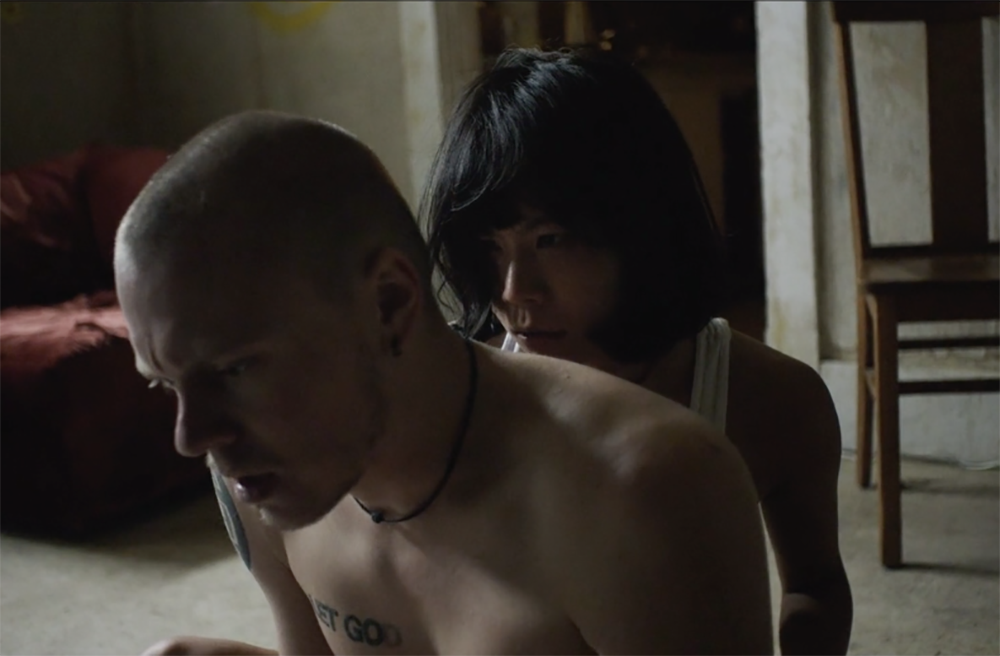Fantasia International Film Festival is here, and it brings us “Baby, Don’t Cry,” a writing/acting project from Actress Zita Bai directed by Jesse Dvorak. Some critics refer to the film as bizarre or unapproachable, but I don’t really find this to be the case. In fact, you can find footing in this film in other past dramas, most notable last year’s “Dinner in America” (though not as comedic) and Ryan Gosling’s “The Place Beyond the Pines.” “Baby, Don’t Cry” examines luckless existence through a coming-of-age and pensive lens, also looking at fatalism, racism, and poverty. It’s brought down somewhat by its script, which pulls back when it should push forward, and its open-to-interpretation ending.
What Zita Bai does with her script is create a narrative about a troubled 17-year-old Chinese immigrant named ‘Baby’ who meets and starts a romance with a wrong-side-of-the-tracks type named ‘Fox’ (Vas Provatakis). But that’s surface-level. The film is also about more; it explores racism and trauma Baby endures from White America, as well as being kept in emotional bondage by her ailing mother, played by Helen Sun. She’s 17, but in one scene her mother states she will forever be 17 so she won’t leave her. First 17+1, then 17+2, etc. It’s not motherly attachment the film explores, however, but codependency as abusive as it is unhealthy.
The strongest part of Bai’s film is the introspective lens it offers Baby and Fox; it’s also here we see the film’s strongest character development. Its lasting impression is it takes a girl we don’t get to know much and a troubled young man the film introduces by showing his worst parts and makes us care about them. It’s here the film has its strongest “Place Beyond the Pines” feel; Fox’s hard, impoverished existence and Baby’s otherness brings them together in believable ways.
It’s also here that one notices the near perfectness of Provatakis’ acting. He gives Fox a sense of fatalism and inescapable destiny that is profound and believable. It’s not just dialogue, either; Provatakis’ physical acting really makes you believe this character is part of a real, inescapable world, and not just a plot device. I can see good things for him in the future.
To me, where the film suffers is in its approach to its backstories and its casual approach to racism often offered without answer. On one level, I sense this is a way to show how ‘other’ the main character is; however, on another the lack of answer to it paints an obscure picture. Seeing as Baby experiences othering by her mother as well as society, it made me question the film’s aim. Is Baby’s otherness the film’s driving force; or does it mean to comment on luckless lives lived by the underbelly of society? Additionally, a recurring image of Baby’s mother nagging and insulting her while transforming into a metamorphic pig I found distracting. Baby’s mother is so toxic the physical layer isn’t wholly necessary.

The biggest criticism, however, is that “Baby, Don’t Cry” seems to shift gears just when it becomes truly interesting. It’s an off-the-cuff romance and coming-of-age story for a person living this type of life—and it does this flawlessly. However, sometimes the film abandons the Fox/Baby plot in lieu of scenes of Baby’s mother (and father, off-screen for most of the film’s run and present only in a flashback). It then shifts back to the romance narrative. I don’t complain that the film’s romance is toxic and likely unhealthy to both characters; I feel the movie supposes that it is. It’s simply that not enough time is given to show the deeper aspects of it and what drives it in place of comments on racism and physical cinematography.
But, at the end of the day, “Baby, Don’t Cry” is indie through-and-through. It’s supposed to be difficult to approach, and it’s supposed to make you think, and it does this with ease. It features good acting and examines people living hard lives and lets us feel empathy for them. Some of the film’s best parts are the exploration of its romance, and Bai has a lot to offer the world of indie film (this writer’s favorite medium). While some elements are distracting, “Baby, Don’t Cry” is a purposeful narrative that entertains. It will hopefully find footing in theaters and streaming platforms to allow audiences to judge the film for themselves.